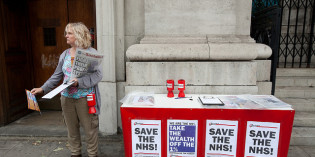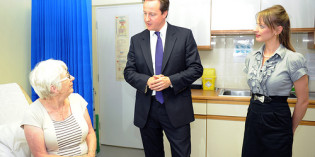Tag: NHS democracy

The handling of the junior doctors’ strike reinforces a vision of the NHS where key voices are neither sought nor listened to
Despite the rise of patient and public involvement, evidence from the junior doctor’s strike suggests that little has changed in terms of the power of Westminster and the lack of public accountability for decisions that lie at the heart of how the NHS is organised. Here, Jonathan Tritter and Mio Fredriksson discuss the tensions between […]

The junior doctor contract: The BMA must pick up the pieces and move forward
The latest episode of the four year battle between the Government and the British Medical Association (BMA) serves as stark reminder of the loneliness of ministerial office. But, argues Tony Hockley, in the end the buck really does stop with the Secretary of State. If the BMA works with the Health Secretary they could make further progress on […]

Why we need an NHS election day
Voters will go to the polls on May 7th for the general election and hundreds of local council elections. There is no equivalent of this election day for NHS Foundation Trust elections, which traditionally see lower levels of public participation. In this post Richard Berry proposes that NHS elections be held simultaneously in order to raise awareness […]

NHS Foundation Trusts have been a source of democratic experimentation for the past decade
Campaigners are promoting a wide range of reforms for the UK’s democratic system, including changing the electoral system, lowering the voting age or allowing people to vote online. While many look overseas for examples of how these innovations work in practice, Richard Berry explains in this post that each has already been introduced at NHS Foundation Trust elections. […]

Patient power could be the driving force behind a revolution in the NHS
Public service user engagement is all the rage across the UK’s three main political parties, with agreement from all ends of the political spectrum that the more we here from people who use services, the better. Here, writing about a new report from OPM, Michael Bonnet and Ingrid Prikken argue that patient power could be the driving force behind […]

NHS Citizen is seeking to deliver engagement processes that meet the needs of policy-makers as well as ensuring the public’s views are heard
Designing public engagement processes and institutions from the perspective of citizens alone makes them easy for policy makers to ignore, argues Simon Burall. He suggests we need to pay more attention to the needs of those making policy in order to design public engagement processes which make a difference, and outlines the development of the […]

10 years after NHS Foundation Trusts were created, their democratic processes are failing
The first Foundation Trusts were launched ten years ago this week, in April 2004. This new model was designed to increase the autonomy of NHS organisations and make them democratically accountable to local communities. The model may have succeeded on the former objective but on the latter they have fallen far short of expectations, argues Democratic Audit’s Richard […]

Health and Wellbeing Boards differ in their levels of transparency, involvement and modes of operation
Health and Wellbeing Boards were introduced alongside the government’s structural reforms of the NHS, as new bodies aiming to bring together NHS commissioners, local government and others, and were expected to provide an important new forum for democratic input into the health service. Anna Coleman and Surindar Dhesi analyse the experience of Health and Wellbeing […]

Expanding the resources and powers of Healthwatch and Overview & Scrutiny Committees would improve the local accountability of health services
Unlike many other public services, the NHS is not subject to local democratic control. In this post – a second extract from Democratic Audit’s new ebook – Sally Ruane examines the barriers to local democratic engagement in the NHS, and identifies ways to improve accountability through local authorities and Healthwatch. Similar PostsCitizens’ ability to influence NHS services is undermined by […]

Citizens’ ability to influence NHS services is undermined by the complexity and ceaseless reform of systems for patient and public representation
Unlike many other public services, the NHS is not subject to local democratic control. In this post – an extract from a new Democratic Audit ebook – Sally Ruane explores the recent history of patient and public involvement in the NHS, including the impact of the coalition government’s reforms. Similar PostsExpanding the resources and powers of Healthwatch and […]


 Democratic Audit's core funding is provided by the Joseph Rowntree Charitable Trust. Additional funding is provided by the London School of Economics.
Democratic Audit's core funding is provided by the Joseph Rowntree Charitable Trust. Additional funding is provided by the London School of Economics.